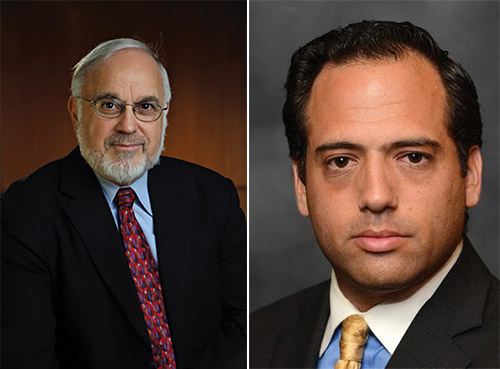
Perhaps it was the lead-up to Purim. Perhaps it was the unprecedented and incredibly divisive Clinton-Trump presidential campaign. Perhaps it originates with the alt-right or, with equal possibility, the alt-left.
The ugly truth is that American Jewry is confronted with an array of threats.
To cite just a few:
*Six waves of bomb threats targeting Jewish community centers across the nation, including our own local ones in New Jersey such as the JCC on the Palisades, along with those in Edison, Cherry Hill and Scotch Plains. Most of these incidents’ origins remain unsolved, with it continually unknown if the responsibility lies with domestic extremists, far-right or far-left or even perhaps a foreign (terrorist) entity.
*Online anti-Semitic attacks directed at Jewish reporters and personalities, not attacking on policy but rather in a disturbingly personal fashion. Neo-nazis and U.S.–based bigots over the past year alone have allegedly reported 19,000 anti-Semitic tweets sent by 16,000 users targeting some 800 Jewish journalists.
*Anti-Semitic attacks against Jewish students on campus. Bullying, intimidation and threats against pro-Israel students by extremist groups such as the Students for Justice in Palestine. The tipping point for the dramatic increase in such activity is obviously the incitements of the BDS movement.
These harsh realities should be unifying to the full spectrum of American Jewry and creating among us a united front to demand bi-partisan leadership from our political leaders, upgraded security from our law enforcement and, most importantly, a concerted effort to (re)build important coalitions on the grassroots level to explain to our non-Jewish neighbors the scope of the threats we face in exercising our freedom of religion and assembly.
For the Simon Wiesenthal Center, this is not about winning “gottcha” political points but rather keeping our communities, institutions and children safe. That is why we are focusing so much of our efforts in the tri-state area.
As the New York office led by Michael Cohen, who is a co-author of this piece, continues to testify at one municipality after another, passing resolutions against the latest real vehicle for spreading anti-Semitism in the BDS movement, we find ourselves repeatedly contacted by those both on the respective daises and audiences expressing support for our endeavors to fight hate, but admit that the testimony of myself and my partners in this cause are the first they have heard of the movement.
As we hear about members of our community negatively discuss the attitudes of African Americans when elements of the Black Lives Matter movement is infiltrated by the Students for Justice in Palestine, we point them to the fact that just over the past year, New Jersey State Assemblyman Gordon Johnson worked to bring our communities together in speaking to the Moriah School on Dr. Martin Luther King Day, or how New York State Assemblymember Walter Mosley paid out of his own pocket to fly to Canada in an attempt to convince legislators up north to follow his lead on the eve of the parliament’s vote against BDS and stand up together against hate, or New York State Senator Jesse Hamilton who took the floor of the Senate to describe the need to have our communities come together and fight against the bigots who hate us both, as he learned to do growing up on the streets of Crown Heights in the aftermath of the riots.
Along the way we have discovered a disquieting and discomfiting truth. Most of our children live in a bubble that has disconnected them from even our own recent history and heroes.
Equally, we must recognize our errors in insufficiently teaching our own in the seriousness of dedicating one’s heart and soul to the continued activism that has allowed our community to create the self-proclaimed bubble. As we invite schools to participate in the Simon Wiesenthal Center’s annual lecture on the state of anti-Semitism, we have been made to recognize that many of our high school students have never even heard of our keynote speaker, a very model of the activism in our community against the anti-Semitism of the previous generation, Natan Sharansky.
Let’s not only focus on the bigots and their hate. Rather, we must increasingly stress educating our own—to see the difference between those who hate for the sake of hating, versus those who have not been exposed to our community, our arguments, our traditions and all that we have represented in this world for over three and a half millennia. We must be better at building allies and making our case when we are under attack.
For starters, everyone reading this essay should actively stand behind the proposed bipartisan federal legislation adopting the State Department’s much-expanded definition of anti-Semitism. Such a move will force the U.S. Department of Education to finally step in when Jewish students on campus are intimidated or attacked.
Jewish leaders, including congregational rabbis to pundits and bloggers, should lead the way in ensuring that the battle against anti-Semitism is not lost in the din of left-right politics. We must collectively recognize the expansiveness of anti-Semitism within all facets of the political spectrum and ensuring that we are prepared to combat this hate whatever its source.
By Rabbi Abraham Cooper and Michael Cohen
Rabbi Abraham Cooper is the associate dean of the Simon Wiesenthal Center.
Michael Cohen is the eastern director of the Simon Wiesenthal Center and a councilman in Englewood.













